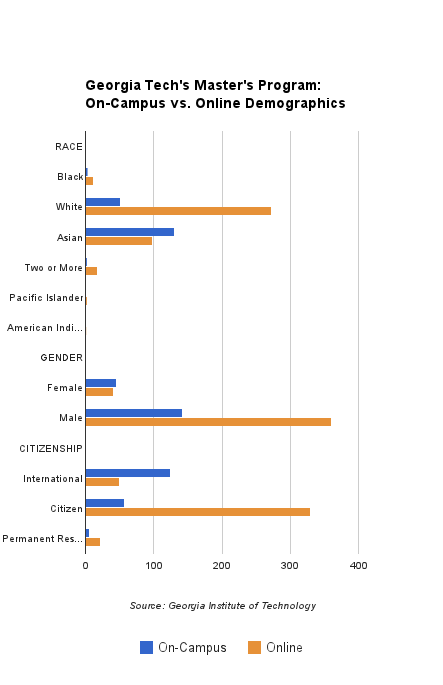You have /5 articles left.
Sign up for a free account or log in.
The Georgia Institute of Technology has admitted its first 401 students to the low-cost online master’s degree program in computer science created in partnership with massive open online course provider Udacity, and the January launch will be the first step toward seeing how scalable such a program can be.
The fully online degree program has been highlighted as a potential business model for Udacity both before and after founder Sebastian Thrun’s much debated “pivot,” a profile in Fast Company that claimed Thrun “no longer believes the hype” about MOOCs. The degree, which can take anywhere from three to six years to complete, costs $6,600 -- less than one-sixth of the full price of a residential program. The pilot launches Jan. 14, 2014, and may enroll as many as 10,000 students over the next few years.
Such a cohort would mostly consist of non-degree-seeking students, however, as the actual master’s degree-granting part of the program is likely to scale more modestly to preserve its quality and rigor.
“We will judiciously increase the size,” said Zvi Galil, dean of College of Computing. Degree-seeking students may in the future number in the several hundreds, not thousands, he said, but at this point the university is operating on “assumptions on scalability, and nobody really knows.”
The spring pilot will start small. Courses will be capped at about 150 students, a size that “matches what we can do on campus,” said Charles Isbell Jr., senior associate dean. Those courses may provide answers to questions such as how many course assistants are needed to help students with the coursework. In the future, the course material will be made available -- for a price -- to non-degree-seeking students.
The 20-day application period in October attracted 2,359 would-be students -- about 1,000 more than the residential program receives in a full year. As a demographic profile of the applicants showed, the makeup of the admitted online students will differ from that of students on campus.
Online students are more likely to be male, white and citizens of the United States. Of the 401 students who will start the program in January, almost 90 percent are men, compared to about 76 percent of students on campus. While white and black enrollment is up, Asian enrollment has decreased.
"Indeed in the gender case, what exists now in the on-campus program was even exacerbated in the online program,” Galil said. “That indicates we have work to do to address this balance.”

The academic backgrounds of students in both programs are largely similar. About 40 percent of students in both programs studied computer science as undergraduates, and their grade point averages only differ by .05 (online students hold the edge with a 3.58 average GPA). This fall’s residential cohort includes 29 Georgia Tech students; the spring’s online cohort, 26.
AT&T, which invested $2 million to subsidize the program, also has a strong presence in the inaugural class. The 514 employees who applied in October totaled more than 20 percent of all applicants to the program, and 82 of them have been admitted to start in January. An AT&T spokesman said the company promoted the program internally and will reimburse tuition costs for employees who enroll.
Another 250 or so students will receive offers of admission in January with a proposed start date in the summer or fall.
The program is not expected to generate much revenue either for Georgia Tech or Udacity in its first two years. Should the pilot be successful and the program enroll the planned 10,000 at once by its third year, the two parties will split a projected $4.7 million in revenue 60-40, with the university taking the larger chunk.
Creating an online course costs at least $300,000, and while that’s a low estimate, it’s also a one-time expense until the course needs to be updated. “The short answer is we appeared to have guessed in the right ballpark, but we really won’t know for another year or two,” Isbell said about the revenue projections.
One of the students in the inaugural class is Bill McCord, who plans to study from Hong Kong, where he works as chief technology officer for the educational software company LearnerNation.
“I have had a strong interest in online education since I participated in the early Stanford [University] online classes,” McCord wrote. “I’ve been fascinated by the potential of MOOCs to disrupt the traditional education system ever since.”
McCord enrolled in the on-campus computer science master’s degree program at Georgia Tech in 2003, but had to put his studies on hold to pursue a career in Shanghai. He said he jumped at the chance to complete his degree remotely, adding, “I have no regrets about my decision, but I have always had a desire to finish what I started.”







